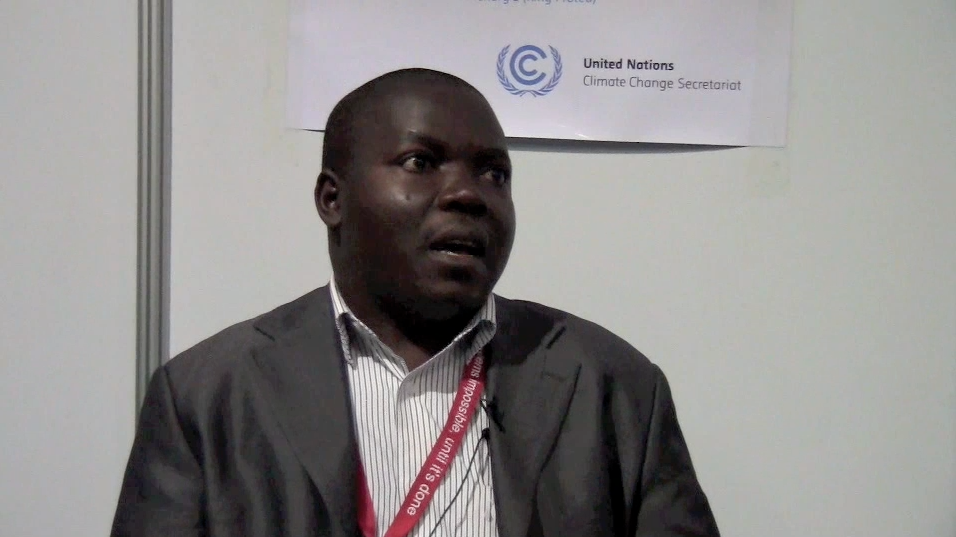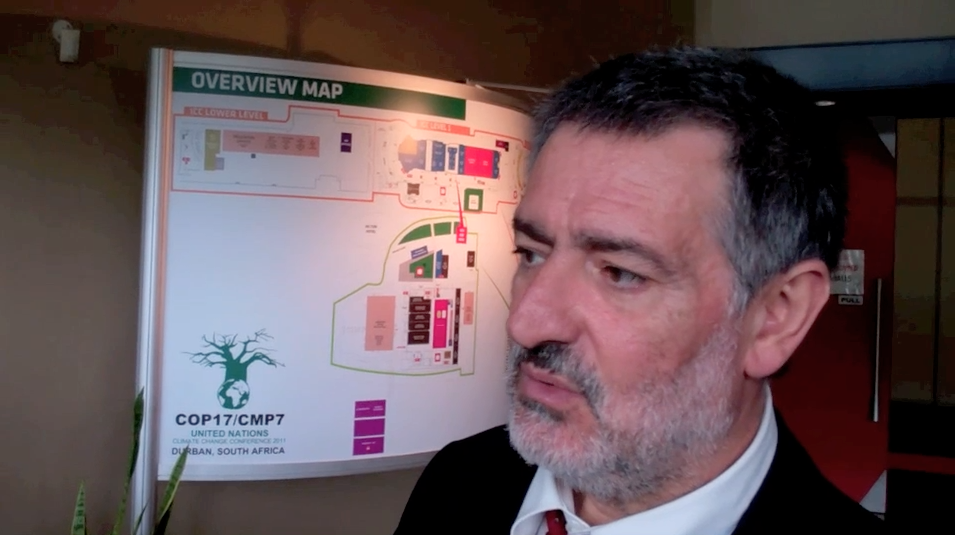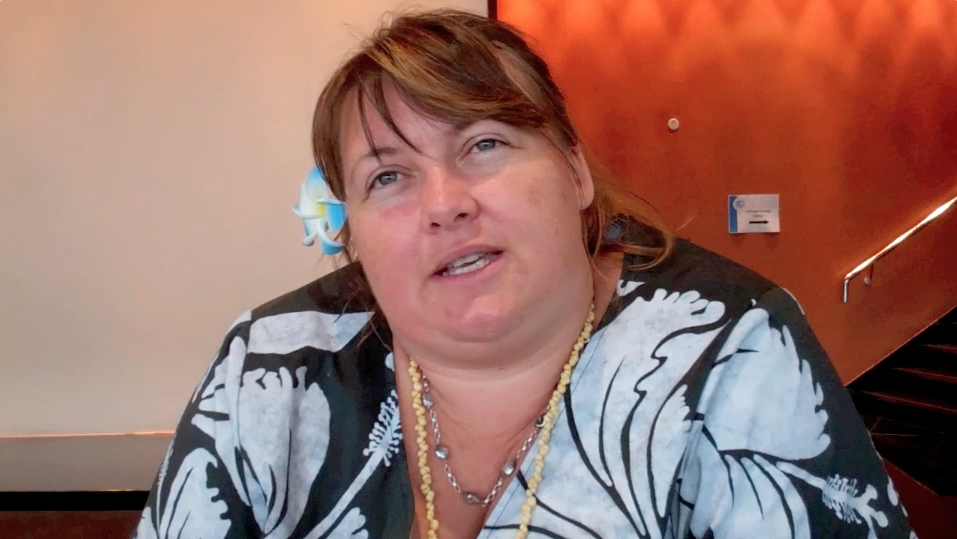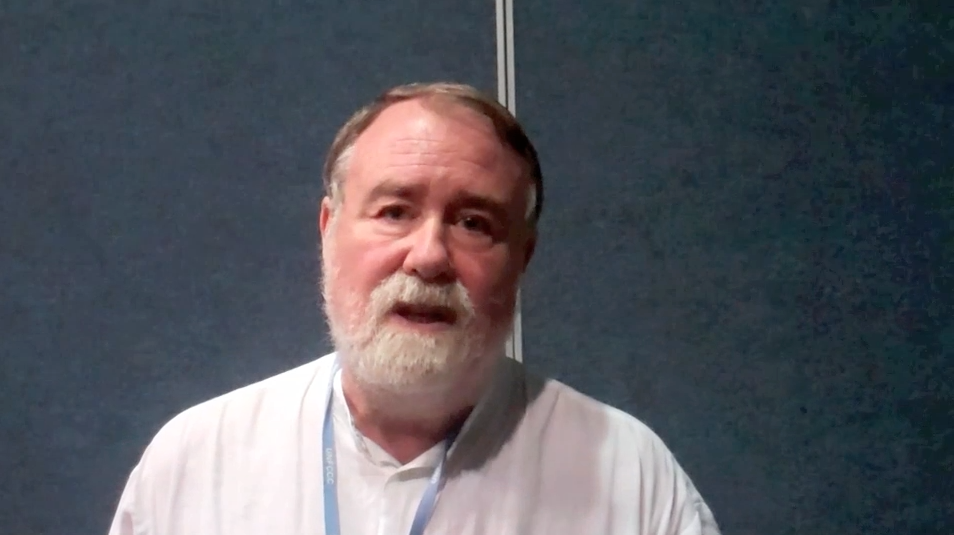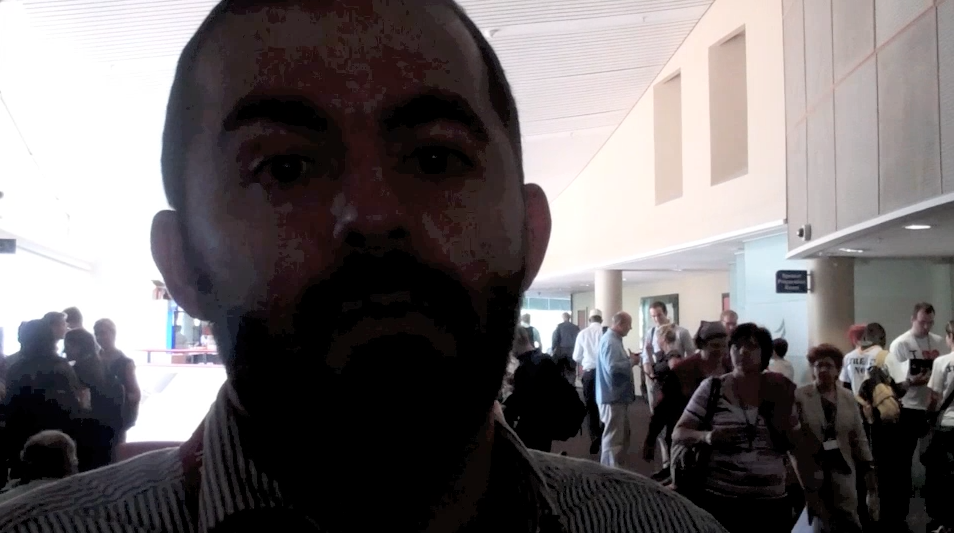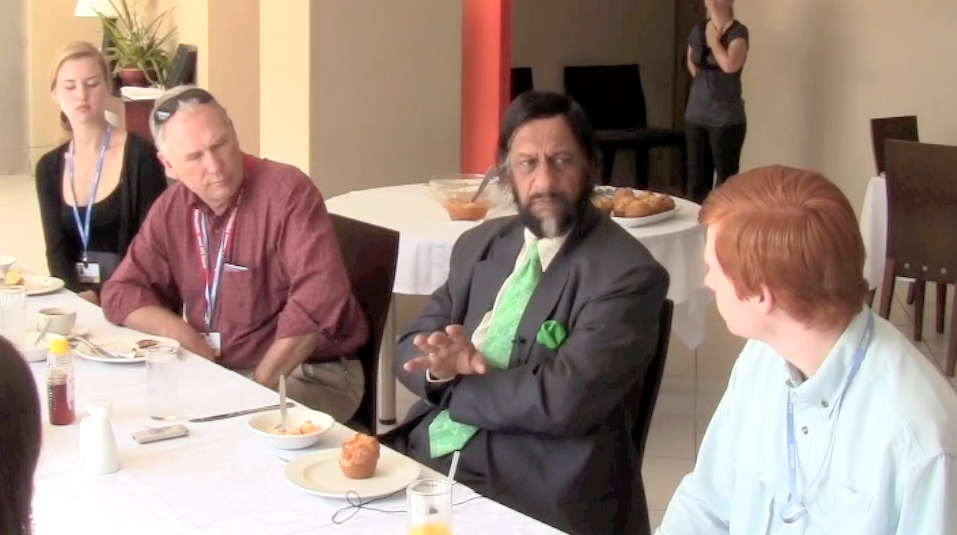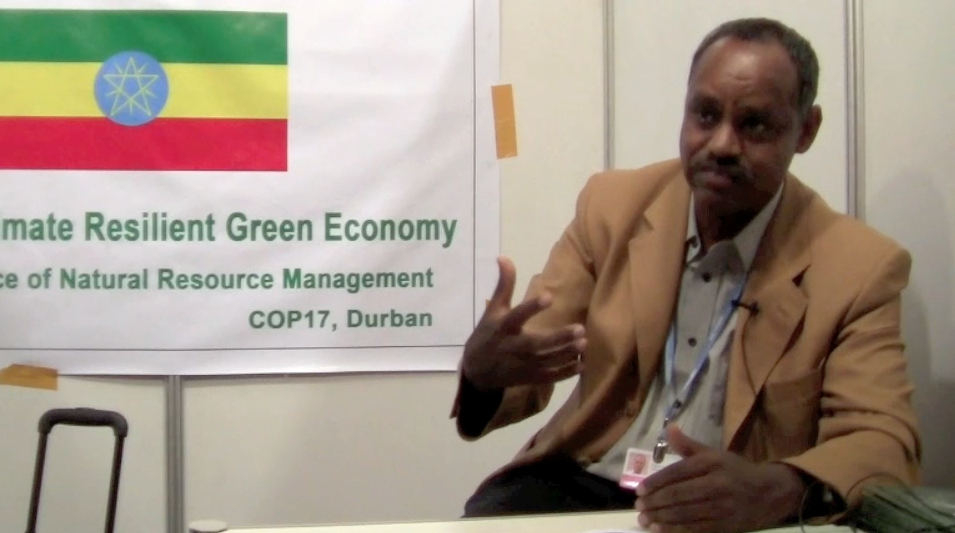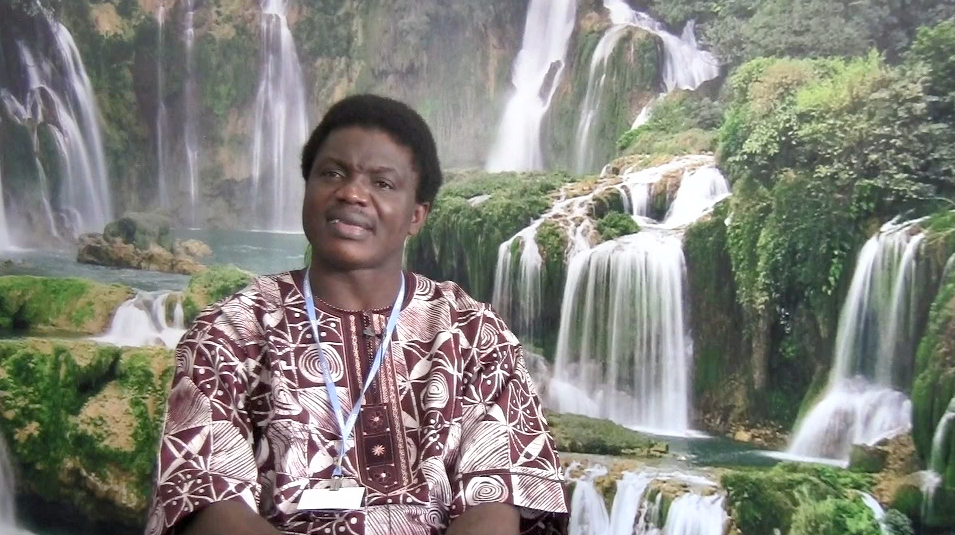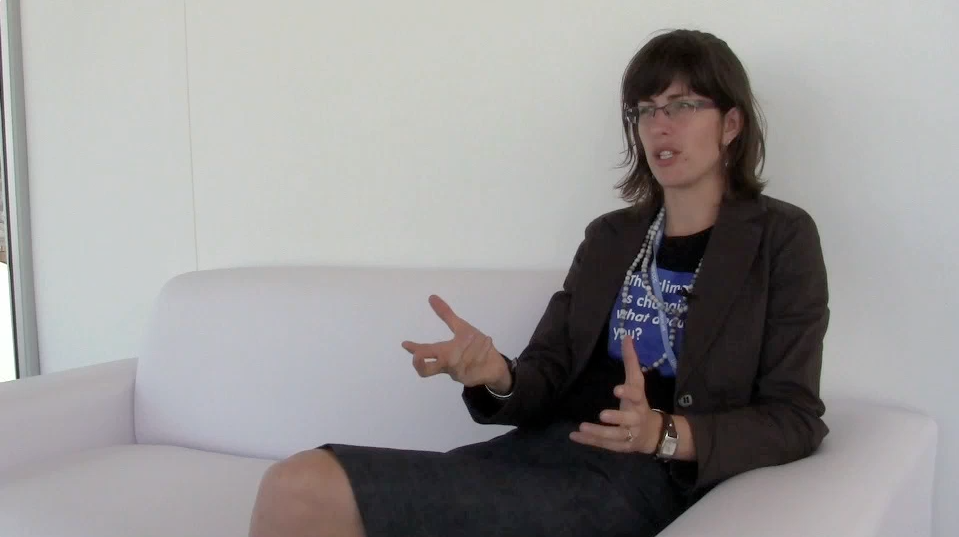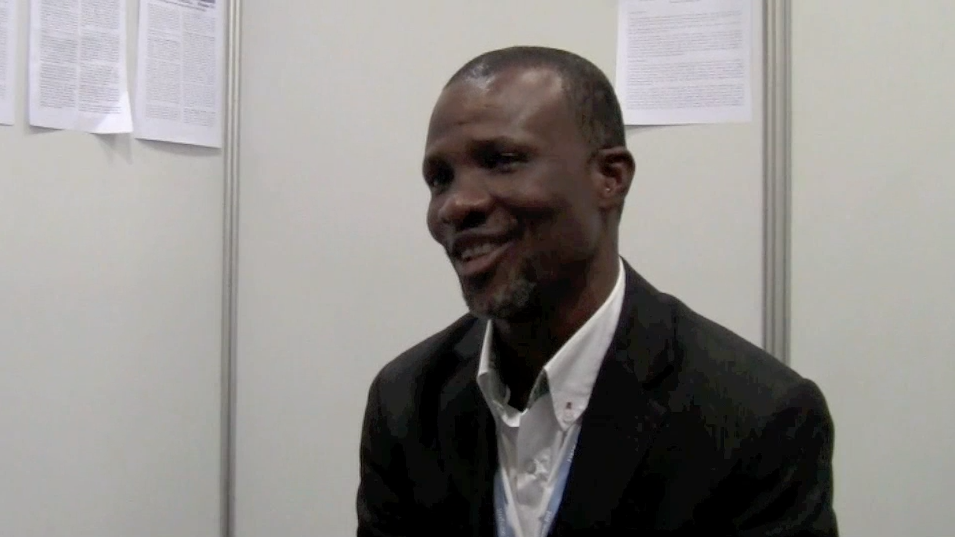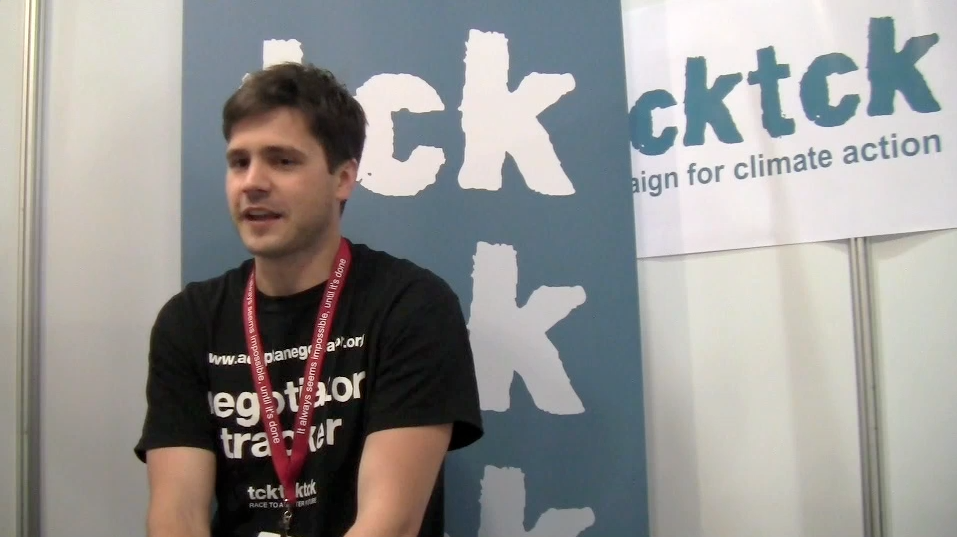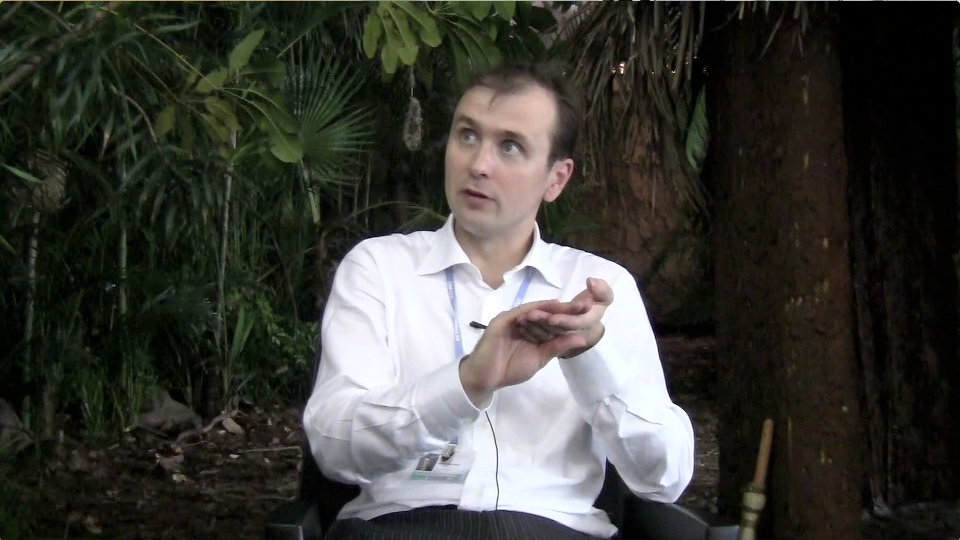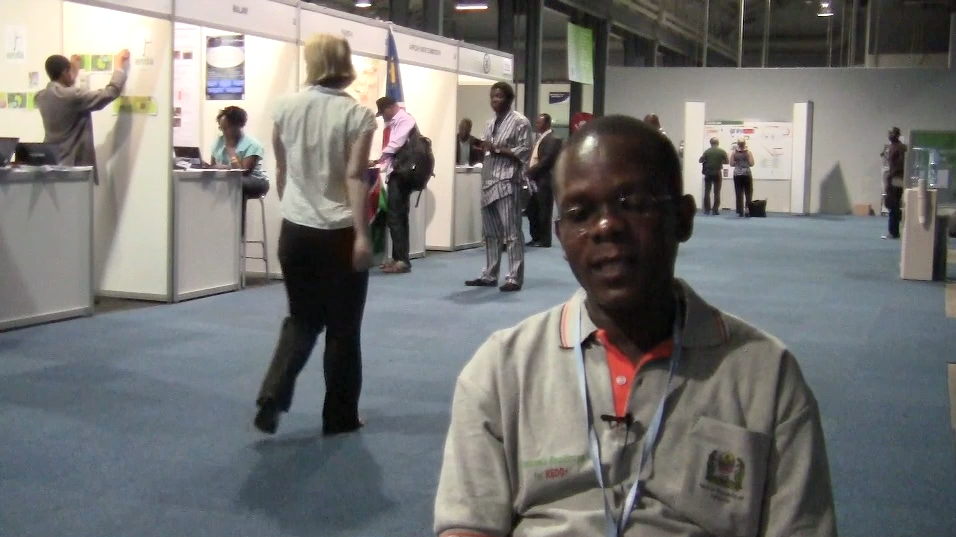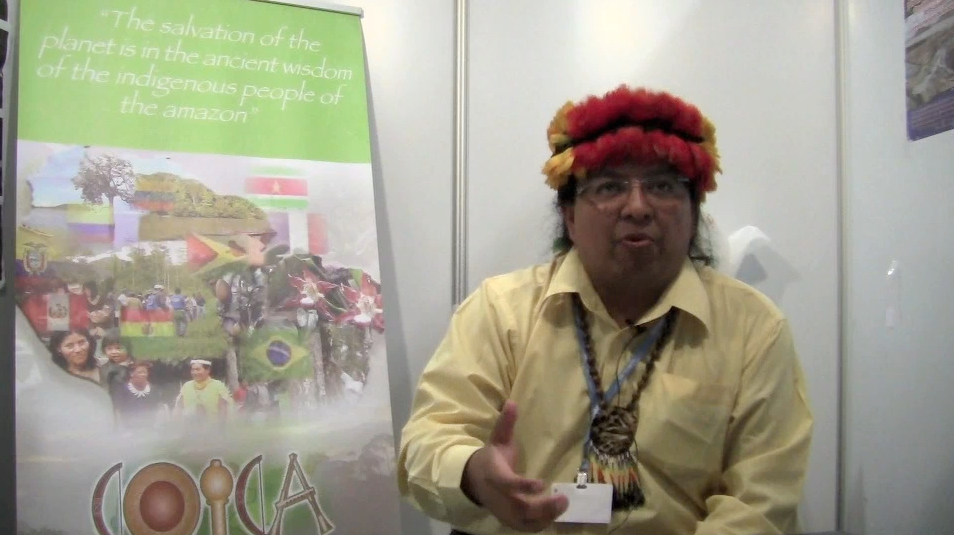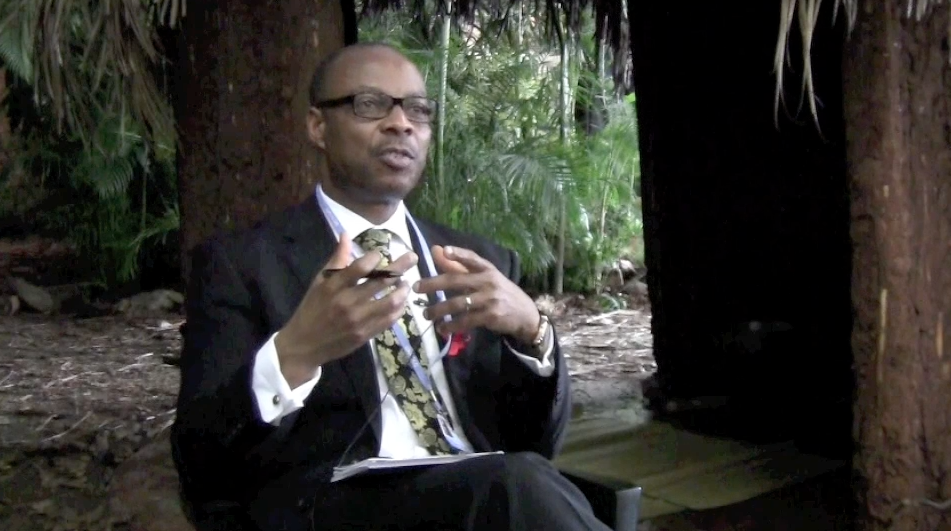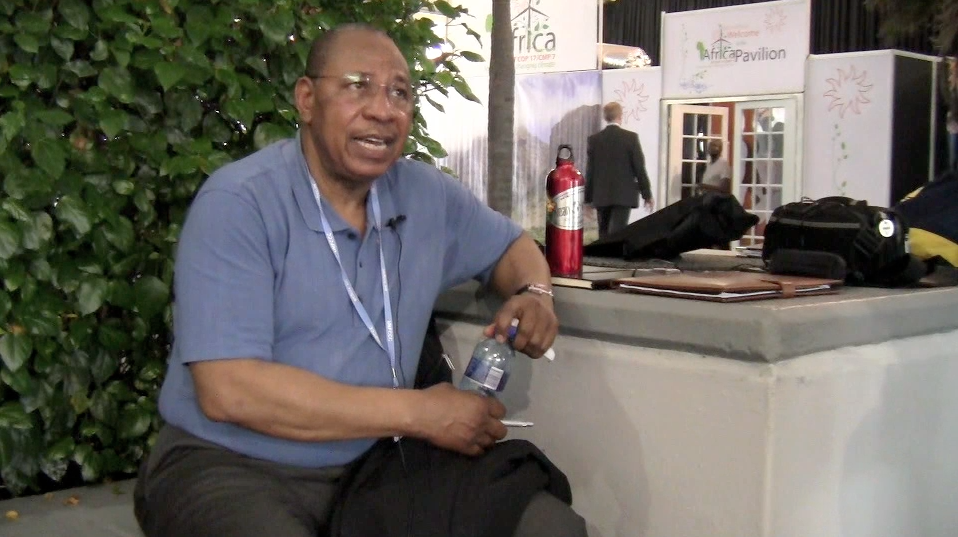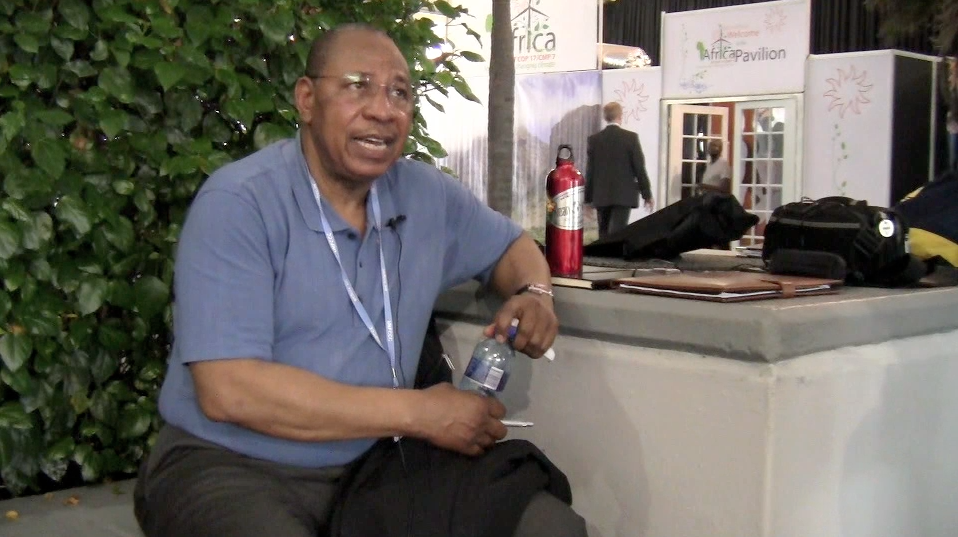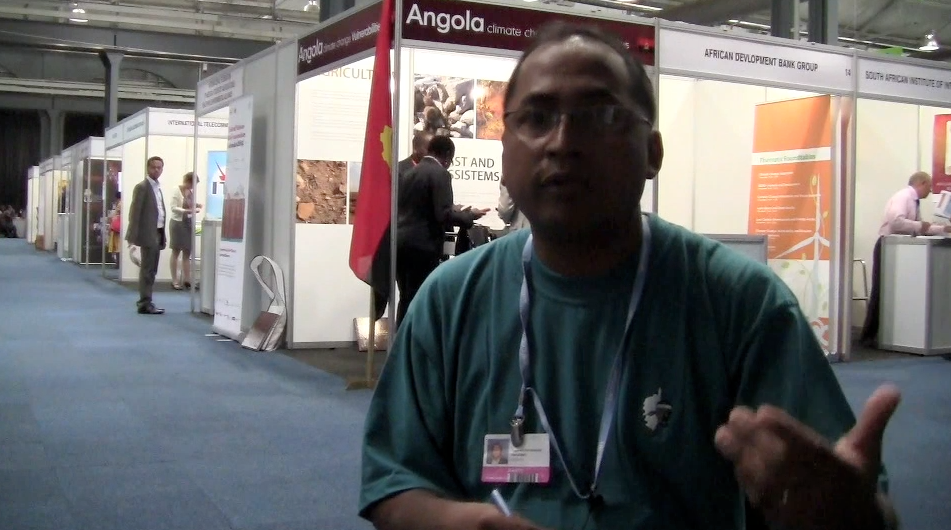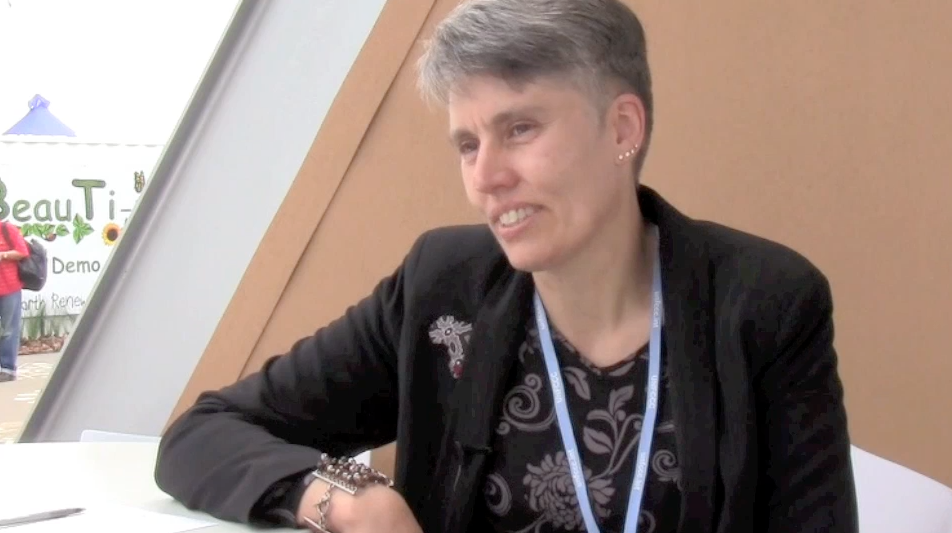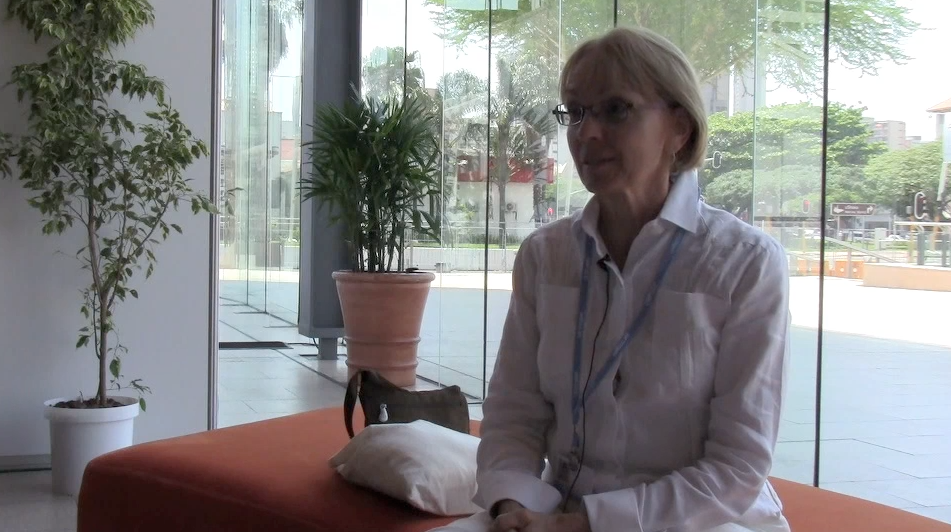Interviewed by Emily Bowie on December 9, 2012, COP 17, Durban, South Africa
Category: All
Interviewed by Emily Bowie on December 9, 2012, COP 17, Durban, South Africa
Dr. José Romero, the Scientific Advisor to the Swiss Federal Department of Transport, Communication, and Energy, discusses the key issues in the climate negotiations. He claims the biggest challenge is finding a balance between what developing countries and developed countries are expecting and want. He says that Switzerland has decided to go ahead with the Kyoto Protocol as well as to launch a process to negotiate a legally binding commitment treaty to go in effect over the next few years.
Interviewed by Timothy Damon on December 9, 2011, COP 17, Durban, South Africa
Interviewed by Timothy Damon on December 9, 2011, COP 17, Durban, South Africa
Interviewed by Claire Tighe on December 9, 2011, COP 17, Durban, South Africa
Interviewed by Emily Bowie on December 9, 2012, COP 17, Durban, South Africa
Interviewed by Elena Capaldi on December 7, 2011, COP 17, Durban, South Africa
David Turnbull, Director of CAN International, discusses the key issues of the climate negotiations, namely a second commitment of the Kyoto Protocol, long term cooperative action, and climate funding. He claims there is a more masked issue of ambition and calls for delegates to match policy with science. He believes that without a second period of the Kyoto Protocol there cannot be a good overall outcome at the conference. He then discusses USA ambition and calls for more action like the Tar sands protests of Fall 2011.
Interviewed by the Claire Tighe on December 7, 2011, COP 17, Durban, South Africa
Dr. Rajendra K. Pachauri, Chairperson for the Intergovernmental Panel on Climate Change, discusses how his expectations for COP17 in the areas of REDD, funding, and adaptation have not been met. He explains that if they were met it would mean significant progress for climate change, not necessarily major steps, but something to build on. He expresses a fear for the current level of confidence in the system.
Interviewed by the Dickinson Climate Mosaic on December 7, 2011, COP 17, Durban, South Africa
Dr. Rajendra K. Pachauri, Chairperson for the Intergovernmental Panel on Climate Change, discusses how adaptation is going to take a lot of involvement at the local level with state and national involvement to ensure capacity is built. However, mitigation efforts need to take place at a global level because it is a global issue. He also explains how the IPCC increases local capacity of low development regions to collect climate data and understand how climate change will affect them so they can adapt accordingly.
Interviewed by the Dickinson Climate Mosaic on December 7, 2011, COP 17, Durban, South Africa
Dr. Rajendra K. Pachauri, Chairperson for the Intergovernmental Panel on Climate Change, discusses how the process of intense peer review in IPCC report production, while it slows down the process, is extremely necessary in gaining trust from politicians. He voices concern for advocacy for action on the science the IPCC collects. He claims the IPCC does not have the time or resources to advocate for climate action and encourages others to take the sound science they have collected and spread awareness about it.
Interviewed by the Dickinson Climate Mosaic on December 7, 2011, COP 17, Durban, South Africa
Dr. Rajendra K. Pachauri, Chairperson for the Intergovernmental Panel on Climate Change, discusses how both the host country and the secretariat run the COP. He voices concern for the level of ambition at the last few COPs and the perception that little baby steps are great achievements. He fears that the results of these conferences are not enough to warrant the amount of money and resources that go into planning them.
Interviewed by the Dickinson Climate Mosaic on December 7, 2011, COP 17, Durban, South Africa
Dr. Rajendra K. Pachauri, Chairperson for the Intergovernmental Panel on Climate Change, explains the steps he believes need to be taken to breach the gap between climate science and the policy being made. First, the science community needs to communicate more. Second, there are vested interests that need to be addressed. Last, in the context of COP 17, we need to address the fact that science is not playing as big of a role in the conference as it needs to.
Interviewed by the Dickinson Climate Mosaic on December 7, 2011, COP 17, Durban, South Africa
Dr. Rajendra K. Pachauri, Chairperson for the Intergovernmental Panel on Climate Change, discusses the need for urgency in climate change action. The AR4 report declares that in order to stabilize temperature to between 2-2.4 degrees we must peak emissions within four years in the least cost manner. He claims we are losing time because we are losing our least cost options. He is uncertain about solutions to these problems; he voices hesitation about the UNFCCC process as a whole, declares the need for country mobilization, and claims there is a serious lack of leadership and a sense of urgency.
Interviewed by the Dickinson Climate Mosaic on December 7, 2011, COP 17, Durban, South Africa
Dr. Rajendra K. Pachauri, Chairperson for the Intergovernmental Panel on Climate Change, discusses his views of the REDD+ initiative. He claims REDD is important but has a lot of measurement, monitoring and institutional problems.
Interviewed by the Dickinson Climate Mosaic on December 7, 2011, COP 17, Durban, South Africa
Mr. Negash Teklu from Ethiopia, Executive Director of Population, Health, Environment (PHE) Consortium Ethiopia and COP 17 Party Member to Ethiopia, discusses how climate change is affecting the environment in Ethiopia and East Africa in general and how these changes are negatively affecting poverty levels. He also discusses the hope Ethiopia has for the COP and the second period of the Kyoto Protocol.
Interviewed by Emily Bowie on December 6, 2011, COP 17, Durban, South Africa
Mr. Negash Teklu from Ethiopia, Executive Director of Population, Health, Environment (PHE) Consortium Ethiopia and COP 17 Party Member to Ethiopia, discusses the adaptation knowledge that local communities in East Africa possess and the need for governments, civil society and the private sector to engage the local communities and utilize this knowledge for adapting to climate change.
Interviewed by Emily Bowie on December 6, 2011, COP 17, Durban, South Africa
Mr. Negash Teklu from Ethiopia, Executive Director of Population, Health, Environment (PHE) Consortium Ethiopia and COP 17 Party Member to Ethiopia, discusses the activities of PHE-Ethiopia including pilot sites, social research and workshops. He then explains the sources and system of funding for the organization.
Interviewed by Emily Bowie on December 6, 2011, COP 17, Durban, South Africa
Mayor Ayodele Adebowale Adewale of Lagos, Nigeria discusses Nigeria’s position within the negotiations and a multitude of sustainable initiatives occurring in Lagos, and calls for developed countries to help developing countries adapt and mitigate for the good of the entire planet.
Interviewed by Elena Capaldi and Anna McGinn on December 5, 2011, COP 17, Durban, South Africa
Ms. Anna Taylor of the African Center for Cities and the Stockholm Environment Institute discusses how funding for South Africa’s sustainable development needs to come from both internal and external sources. She voices the need to be wary of international money tied to international agendas.
Interviewed by Emily Bowie, Elena Capaldi and Maggie Rees on December 5, 2011, COP 17, Durban, South Africa
Anna Taylor of the African Center for Cities and the Stockholm Environment Institute discusses South Africa’s position as they move forward with sustainable development after COP 17. She notes poverty and economic inequality as the biggest obstacle for South Africa’s development. Coal as the primary source of energy is also a huge issue as the fuel is one of the dirtiest forms of energy and this will need to change as the country develops. Taylor also notes that the country has rapidly transitioned into a democracy and is still working to make that a reality.
Interviewed by Emily Bowie, Elena Capaldi and Maggie Rees on December 5, 2011, COP 17, Durban, South Africa
Ms. Anna Taylor of the African Center for Cities and the Stockholm Environment Institute discusses how the outcomes of the COP will most likely create a downstream effect over development in South Africa that may not be immediately noticeable or easily tracked.
Interviewed by Emily Bowie, Elena Capaldi and Maggie Rees on December 5, 2011, COP 17, Durban, South Africa
Ms. Anna Taylor of the African Center for Cities and the Stockholm Environment Institute discusses her work through both institutions looking at vulnerability and adaptation initiatives. She explains how she is promoting their research, making connections and learning more about climate change. She then explains her hopes for the outcome of the COP and her belief in the need to lead by example. She calls for an end in the negotiations standoff.
Interviewed by Emily Bowie, Elena Capaldi and Maggie Rees on December 5, 2011, COP 17, Durban, South Africa
Mr. Tetteh Hormeku, Programme Officer for the Third World Network’s Africa Secretariat, discusses the Africa Group and their hopes for the negotiations. These hopes include a second commitment priod for the Kyoto Protocol and greater developed country responsibility. He explains the reasons that African countries have decided to work together to push their agendas these reasons include, among others, ecosystem vulnerability as well as economic vulnerability.
Interviewed by Anna McGinn on December 5, 2011, COP 17, Durban, South Africa
Dr. Kevin C. Urama, Executive Director of the African Technology Policy Studies Network (ATPS), voices his desire for the government’s of the world to wise up and save the planet. He calls for a legally binding agreement and praises the knowledge sharing occurring at COP 17 between countries. Urama then explains that African adaptation initiatives are coming from multiple actors, the most interesting being rural farmers who are forced to adapt out of necessity. He says funding for these activities comes from multiple relationships – mainly bilateral international and national agencies. He calls for the private sector to invest in adaptation initiatives because governments cannot fund it forever and, he claims, they could make business out of it.
Interviewed by Emily Bowie on December 5, 2011, COP 17, Durban, South Africa
Josh Weise, a United States youth and Project Director of the “Adopt a Negotiator” project, calls to USA youth not to be discouraged by the lack of activity of their government on this front and to instead, mobilize at the local and state levels. He asks them not to lose sight of the bigger vision of national change, saying this will come out of the grassroots mobilization. He asks youth to make sure their efforts are adding to real change on the ground.
Interviewed by Danielle Thompson on December 2, 2011, COP 17, Durban, South Africa
Josh Weise, a United States youth and Project Director of the “Adopt a Negotiator” project, explains how the project brings youth from many different countries to the negotiations to follow and put pressure on their national delegations as well as report to people back home about the progress. He says the project grew out of a need for youth to have their voices heard about an issue that will affect them more than their country delegates and is close to their hearts.
Interviewed by Danielle Thompson on December 2, 2011, COP 17, Durban, South Africa
Mr. John Ward, Director of Vivideconomics, discusses the difference between the Adaptation Fund, the Green Climate Fund (GCF) and the Global Environment Facility (GEF), including purposes and sources. He explains the necessity for the GCF separate from the GEF and voices a prediction for the outcome of the conference concerning the GCF.
Interviewed by Emily Bowie on December 1, 2011, COP 17, Durban, South Africa
Mr. Charles K. Meshack, Executive Director at Tanzania Forest Conservation Group, discusses Tanzania’s postion in the COP 17 negotiations. He says the country wants to call attention to issues other than REDD that are further behind in progress, including adaptation, technology transfer and financing. Tanzania is pushing for these initiatives because climate change in the country is real and rural people are already seeing the effects. Ultimately, the country is looking for technology and capacity building to develop sustainably and decrease climate vulnerability.
Interviewed by Anna McGinn and Samuel Pollan on December 1, 2011, COP 17, Durban, South Africa
Mr. Charles K. Meshack, Executive Director at Tanzania Forest Conservation Group, discusses the structure and goals of REDD+ in Tanzania and the social impacts of the program, including monetary issues. He also discusses the relationship between REDD+ and local communities and counters the common perception that REDD+ is designed to take resources away from local people.
Interviewed by Anna McGinn and Samuel Pollan on December 1, 2011, COP 17, Durban, South Africa
Mr. John Ward, Director of Vivideconomics, discusses the different sources of funding reserved for adaptation and development initiatives. Development funding is meant to come from the Overseas Development Agency (ODA) while funding for adaptation comes from several sources, some bilateral, some multilateral. He explains the difference between spontaneous and programmed adaptation funding and then explains the “moral” argument around the responsibility of developed countries to pay for adaptation.
Interviewed by Emily Bowie on December 1, 2011, COP 17, Durban, South Africa
Mr. Juan Carlos Jintiach, Coordinator in the Field of International Economic Cooperation and Autonomous Development with Identity for the Coordinator of Indigenous Organizations of the Amazon Basin (CORCA), discusses the relationship between the indigenous people of the Amazon and REDD efforts. He also discusses the activities of CORCA, his expectations for the COP and his belief that civil society involvement is the key to moving the negotiations forward.
Interviewed by Samuel Pollan on December 1, 2011, COP 17, Durban, South Africa
Mr. Jean-Marie Kileshye Onema, Democratic Republic of Congo Negotiator and Research Coordinator for the Southern Africa Development Community, discusses his belief that dealing with climate change locally but with a global understanding is the most efficient way. He then explains that differing ideas on who should share the responsibilities of climate change as the reason nations are having difficulties coming up with a plan for climate change.
Interviewed by Christine Burns on December 1, 2011, COP 17, Durban, South Africa
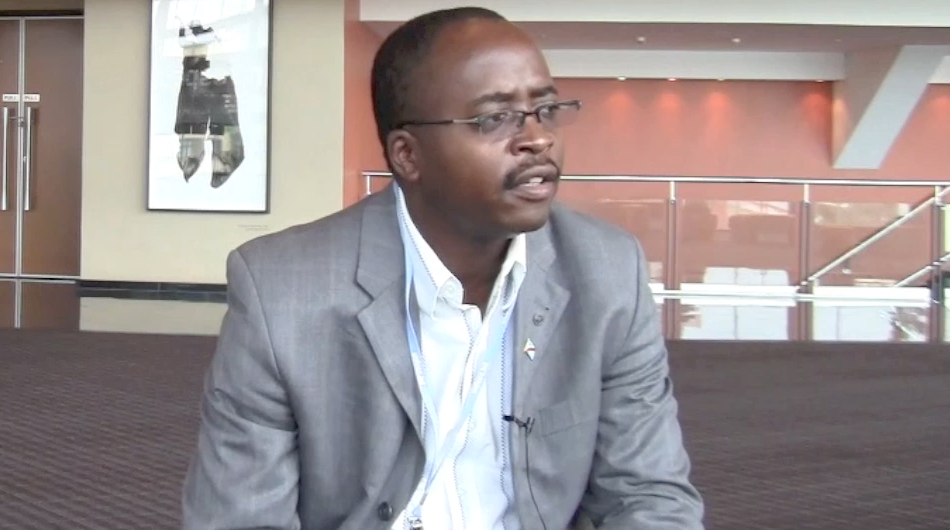
Jean-Marie Kileshye Onema on the Democratic Republic of Congo’s position in the climate negotiations
Mr. Jean-Marie Kileshye Onema, Democratic Republic of Congo Negotiator and Research Coordinator for the Southern Africa Development Community, discusses what climate change means for the Democratic Republic of Congo, the importance of a second period of the Kyoto Protocol for the DR Congo and what other countries agree with that importance.
Interviewed by Christine Burns on December 1, 2011, COP 17, Durban, South Africa
Dr. Tony Nyong, Principle Climate Change Expert at the African Development Bank, discusses how local communities have been adapting to climate forever, but that adaptation to anthropogenic climate changes needs to come from a variety of sources. More specifically, he emphasizes that different planning efforts for adaptation are done at different levels and therefore funding has to come from a variety of places including local, national and international sources. He also talks about the role adaptation is playing at COP 17.
Interviewed by Esther Babson, Emily Bowie, Christine Burns, and Maggie Rees on December 1, 2011, COP 17, Durban, South Africa
Dr. Saleemul Huq, Senior Fellow at the International Institute for Environment and Development Climate Change Group, explains the role of vulnerable countries in the negotiations under three main groups: AOSIS, LDCs and the African Group. He continues to explain what these countries should aspire to do in the face of no binding agreement.
Interviewed by Esther Babson, Anna McGinn, Maggie Rees and Claire Tighe on November 30, 2011, COP 17, Durban, South Africa
Dr. Saleemul Huq, Senior Fellow at the International Institute for Environment and Development Climate Change Group, discusses how climate change will severely affect the development of poor countries in the near future. He says in the long term, however, China and the United States will begin to compete for integrating sustainability into what he says will be the new economy. Huq believes it will be competition, not negotiations, that will eventually drive the transition into a green economy. However, he describes the necessity for the issue to still be solved as a global challenge because it is in essence a global problem. Finally, he emphasizes the ever-pressing need for on the ground action.
Interviewed by Esther Babson, Anna McGinn, Maggie Rees and Claire Tighe on November 30, 2011, COP 17, Durban, South Africa
Dr. Saleemul Huq, Senior Fellow at the International Institute for Environment and Development Climate Change Group, names the most critical issues at the 17th Conference of the Parties to be a second period for the Kyoto Protocol and the construction of the Green Climate Fund. He names setting up the adaptation tract and working on the texts for the NAPs, REDD+ and technology transfer as the smaller and more likely to be solved issues. He then explains how likely he believes it is for conclusions to be met on these issues.
Interviewed by Esther Babson, Anna McGinn, Maggie Rees and Claire Tighe on November 30, 2011, COP 17, Durban, South Africa
Dr. Saleemul Huq, Senior Fellow at the International Institute for Environment and Development Climate Change Group, explains the Green Climate Fund and its history as well as its future in the current conference and beyond.
Interviewed by Esther Babson, Anna McGinn, Maggie Rees and Claire Tighe on November 30, 2011, COP 17, Durban, South Africa
Dr. Youba Sokona of Ethiopia, the coordinator of the African Climate Policy Centre (ACPC) based in the UN Economic Commission for Africa, discusses the need for a new global paradigm. He also explains the opportunity Africa faces to embark of “jump-start” sustainable development due to the primary stages of development the continent is currently in. He names the four biggest barriers to this solution: political will, institutions, finance and short-term focus. He then provides examples for how each of these barriers can be broken.
Interviewed by Elena Capaldi, Maggie Rees and Emily Bowie on November 30, 2011, COP 17, Durban, South Africa
Dr. Youba Sokona of Ethiopia, the coordinator of the African Climate Policy Centre (ACPC) based in the UN Economic Commission for Africa, discusses how the primary concern of all African countries is development and how through climate research over the past few decades his organization has seen the need for countries to revisit their development objectives. He calls for these countries to follow a different development path.
Interviewed by Elena Capaldi, Maggie Rees and Emily Bowie on November 30, 2011, COP 17, Durban, South Africa
Mr. Abias Huongo of the Angola delegation, founder and president of Angola’s biggest environmental organization Juventude Ecologica d’ Angola, discusses Angola’s interest in a second commitment of the Kyoto Protocol, long term finance, capacity building and technology transfer. He points out other countries that have similar and differing perspectives from Angola’s.
Interviewed by Esther Babson and Christine Burns on November 29, 2011, COP 17,
Mr. Tiana Ramahaleo from the Madagascar delegation and World Wildlife Fund discusses Madagascar’s role within the G77 and the African Group. He also explains Madagascar’s wishes for a second commitment period of the Kyoto Protocol and further progress on REDD. Ramahaleo also explains the different views Madagascar has compared with Canada and the United States concerning the negotiations – he believes if developed countries don’t want to participate in the Kyoto Protocol they should at least step aside and stop interfering.
Interviewed by Anna McGinn on November 29, 2011, COP 17, Durban, South Africa
Mr. Tiana Ramahaleo from the Madagascar delegation and World Wildlife Fund discusses Madagascar’s alarming vulnerabilities to climate change, both in biodiversity and livelihoods. He then describes the critical issues that the delegation from Madagascar is following at COP 17.
Interviewed by Anna McGinn on November 29, 2011, COP 17, Durban, South Africa
Interviewed by Maggie Rees on November 28, 2011, COP 17, Durban, South Africa
Dr. Kristie Ebi, Executive Director of the Technical Support Unit Group II under Working Group II of the International Panel of Climate Change, discusses the recent release of a report, “Managing the Risks of Extreme Events and Disasters to Advance Climate Change.” She discusses the history and significance of the report, scientific consensus and how the report may impact policy decisions made at the conference.
Interviewed by Timothy Damon on November 28, 2011, COP 17, Durban, South Africa
